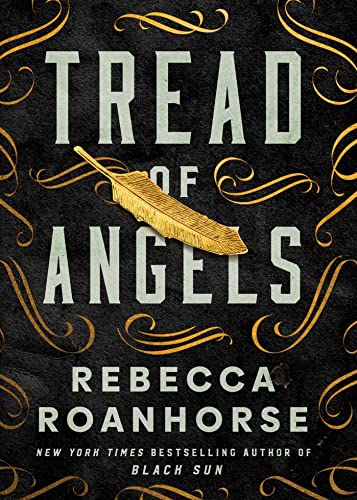![]() Tread of Angels by Rebecca Roanhorse
Tread of Angels by Rebecca Roanhorse
 The setting in Rebecca Roanhorse’s 2022 novella Tread of Angels is eerie and vivid, like a strange dream, both ethereal and concretely described. The conceit of this world is wonderful and I would like to read more stories set here. This particular one was disappointing, with fairly flat characters acting out a familiar plot.
The setting in Rebecca Roanhorse’s 2022 novella Tread of Angels is eerie and vivid, like a strange dream, both ethereal and concretely described. The conceit of this world is wonderful and I would like to read more stories set here. This particular one was disappointing, with fairly flat characters acting out a familiar plot.
Long ago, the battle of the rebel angels against heaven actually took place. In the setting of the story, Lucifer’s great general Abaddon was vanquished and fell to earth. Over the eons (I guess), Abaddon’s body transmuted. Now, humans call it divinity and mine it as an energy source.
Goetia, a thriving human boomtown has grown up around the mine complex, carrying a feeling the late 19th century north American frontier. Some people are believed to have descended from Lucifer’s followers, and they are called the Fallen, a definitive underclass, while the humans who call themselves the Elect control the commerce, the justice system and the social narrative. Celeste and her sister Mariel were born to a human Elect father and a Fallen mother. Like many Fallen, Mariel has a “mark,” a ring around her iris. Celeste doesn’t, and she was raised by her father as an Elect. When he died, she returned to her sister, and now lives in the “bad” part of town, dealing faro at the bar where her sister sings. Celeste believes it’s her mission to protect Mariel and stay by her side.
Mariel is arrested and charged with the murder of a Elect, Virtue Daniel Alameda. The circumstantial evidence is damning (pun intended) and Mariel’s defense is laughably weak. The justice game is rigged against the Fallen who are considered guilty by their very nature, but Celeste is determined to speak in her defense. The judge agrees to let her. It’s clear he has something up his sleeve, but Celeste persists. At first, she draws her allies to her, like her boss Hypatia, the inventor Zeke, and Celeste’s super-sexy ex, the Demon Lord Abraxas, but when they say things about Mariel that she doesn’t want to hear, she rejects them and strikes out on her own, with predictable consequences.
There is nothing wrong with the story. Celeste didn’t engage me, though. She’s in her early twenties, I assume, but her actions and speech feel like those of a young adolescent. She is impulsive and self-centered. I didn’t feel a connection between her and Mariel, and I didn’t see enough of them to understand other reasons why Celeste might be so desperately loyal. I suppose there is an element of guilt, because Mariel lived a childhood of poverty while Celeste had one of privilege, but that’s the reader filling in. Even less understandable for me was the relationship between Abraxas and Celeste. They broke up because she wouldn’t surrender her soul to him, the book implies—and the plot counts on—the idea that what Abraxas feels for her is stronger than some desire to meet a quota. I never feel that relationship come alive on the page. I know what she sees in him—super-sexy—but I don’t know what he sees in her.
The plot moves to a sad ending that is no real surprise. In her Afterword, Roanhorse cites the Tragic Mulatta trope, which is she exploring here. Roanhorse does subvert this trope, but it wasn’t quite enough to grab my interest. I think in a longer work, the complexity of the relationship of the sisters would have played out, and I would have had time to believe there was something in Celeste that would captivate even a demon lord.
As it was, I contented myself with the slangy frontier language, the strange energy source, Zeke’s contraptions, which made me imagine that steampunk could have a comeback, and the wonderful, scary descriptions of the tunnels and the mines. I hope Roanhorse finds the time to set more stories in this setting.



COMMENT Was I hinting that? I wasn't aware of it. But now that you mention it.... 🤔
So it sounds like you're hinting Fox may have had three or so different incomplete stories that he stitched together,…
It's hardly a private conversation, Becky. You're welcome to add your 2 cents anytime!
If the state of the arts puzzles you, and you wonder why so many novels are "retellings" and formulaic rework,…
I picked my copy up last week and I can't wait to finish my current book and get started! I…